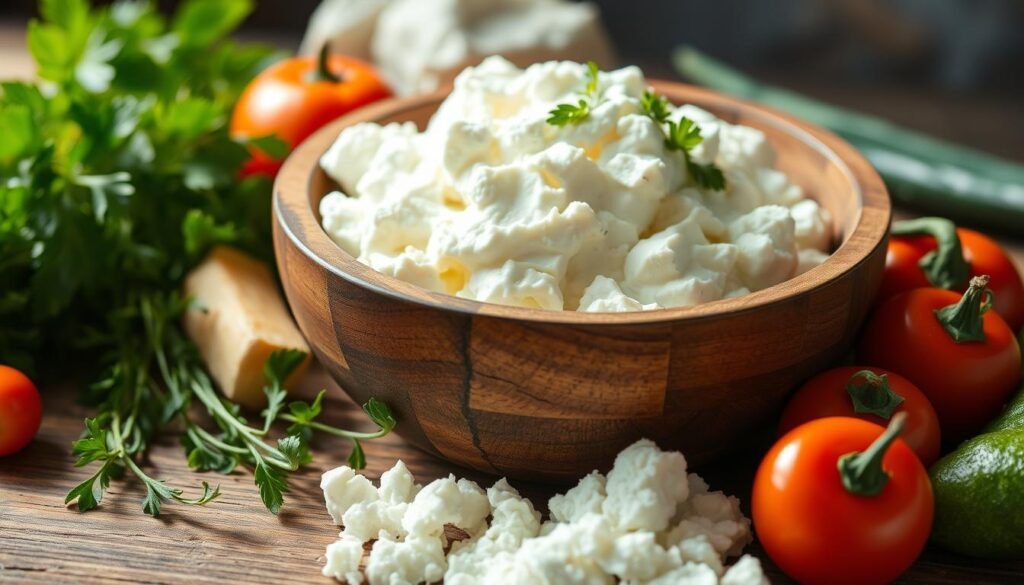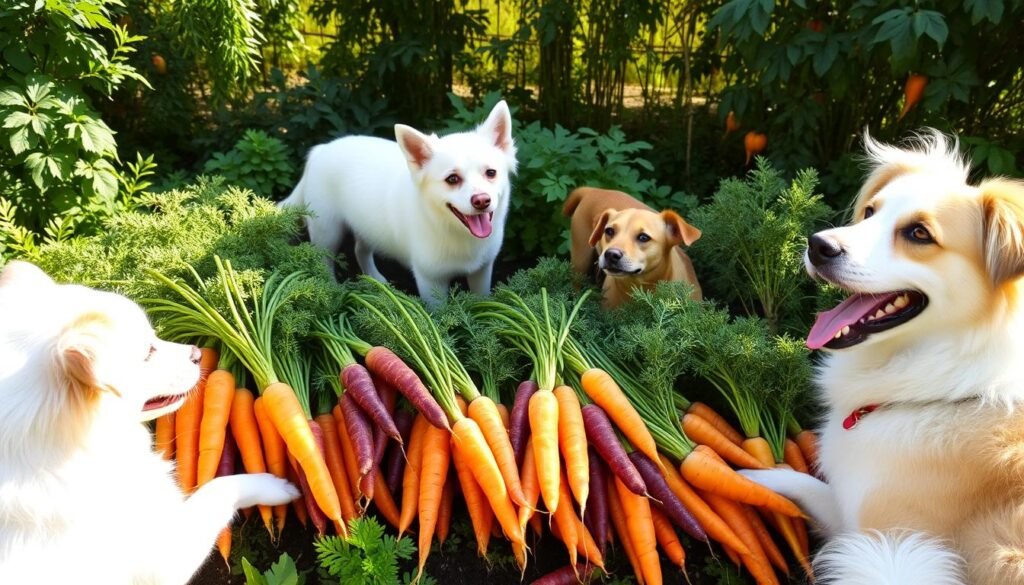Natural probiotics for dogs, Keeping our dogs healthy and happy is very important to us. One great way to help them is by using natural probiotics. These are foods full of good bacteria, like Greek yogurt, green tripe, and some dairy products. They also include fermented foods and veggies.
These foods can greatly improve a dog’s digestion and boost their immune system. They also help with oral health, allergies, and even mood.
Probiotics are the good bacteria and yeasts living in a dog’s gut. They are key to a dog’s health. In fact, 80% of a dog’s immune system is in its gut. The good bacteria there are much more common than the dog’s own cells.
By adding natural probiotics to a dog’s diet, we can keep their gut balanced. This helps prevent problems like diarrhea, gas, cramping, and bad breath.
These probiotic-rich foods are easy to find and can be mixed with other dog-friendly items. There are many recipes online for homemade probiotic treats and supplements. This lets pet owners choose the best ingredients for their dog’s health needs.

Key Takeaways
- Natural probiotics for dogs are foods rich in beneficial gut bacteria and yeasts.
- Probiotics support digestion, boost immunity, promote oral health, control allergies, and improve mood.
- Homemade probiotic recipes allow pet owners to customize ingredients for their dog’s needs.
- Probiotic-rich foods like Greek yogurt, green tripe, and fermented veggies are readily available.
- Consulting a veterinarian is recommended when choosing the best probiotic products for a dog.
What are Natural Probiotics for Dogs?
Natural probiotics for dogs come from foods full of good gut bacteria and yeasts. These foods are key for a healthy digestive system and overall health. Foods like Greek yogurt, fermented foods, and some fruits and veggies are great sources.
Probiotics for Canine Gut Health
Dogs have trillions of good bacteria in their stomachs. These bacteria help with digestion and support the immune system. But, changes in these bacteria can cause problems like diarrhea, allergies, and obesity.
Things like antibiotics, diet changes, stress, and infections can upset a dog’s gut balance. Natural probiotics can help fix this balance. They support better digestion, nutrient use, and immune health.
Natural Probiotic Sources for Dogs
- Greek yogurt and kefir with live cultures
- Fermented vegetables like sauerkraut
- Cottage cheese
- Blueberries
- Goat milk
- Pumpkin
- Sweet potatoes
- Green tripe
- Carrots
- Oatmeal
- Bananas
These foods are easy to add to a dog’s diet. They can be treats or mixed into meals to help their gut health and overall health.
Blueberries: Natural Prebiotics and Probiotics
Blueberries are a superfood full of nutrients, antioxidants, and prebiotics. They help the healthy gut bacteria in dogs. This berry is great for natural probiotics for dogs. It supports their dog gut flora support and helps them have a good balance of beneficial bacteria for dogs.
Fresh blueberries are full of prebiotics. These are special plant fibers that feed the good gut bacteria. When blueberries are fermented, they turn into a natural probiotic treat. They have strains like Lactobacillus plantarum, L. rhamnosus, and L. brevis. These live cultures keep the dog gut flora balanced and boost the immune system.
Blueberries can be given as a healthy dog treat alone, mixed with oats and xylitol-free peanut butter, or made into small natural dog remedies. The right amount of blueberries for dogs is half a tablespoon to four tablespoons or a quarter of a cup, based on the dog’s size.
“Blueberries are a true superfood for dogs, packed with antioxidants, fiber, and natural probiotics that support a healthy gut and immune system.”
Goat Milk: Lactose-Free Dairy Probiotic
Goat milk is great for dogs, offering probiotics and important nutrients. It’s easier for dogs to digest than cow’s milk because it has less lactose and casein. This is perfect for dogs with sensitive stomachs or lactose intolerance, which affects about 0.2% of dogs.
Goat milk is packed with protein, fat, and vitamins like B6 and A. It also has minerals like selenium, calcium, and magnesium. Plus, it has more beneficial fatty acids than cow milk. These nutrients make goat milk a top choice for dogs and can help prevent skin cancer with its antioxidants.
Fermented Goat Milk: A Probiotic Powerhouse
Fermented goat milk is even better for dogs. Products like kefir and yogurt from fermented goat milk have lots of good bacteria. These bacteria help with dog digestive health and support the immune system. Adding fermented goat milk to dog kibble or homemade meals is a great way to boost your pet’s health.
The right amount of goat milk for dogs is 2 to 8 ounces a day, based on their size. Always start with a small amount and watch how your dog reacts before giving more.
“Goat milk soap is recommended by many dog owners as it does not irritate sensitive skins, particularly in dogs with skin problems due to allergies and diseases like Cushing’s.”
Goat milk is also good for a dog’s skin and coat. Goat milk soap is gentle and can help dogs with skin issues or allergies and Cushing’s disease.
Goat milk is a great natural probiotic and digestive aid for dogs. It offers many health benefits that can improve your pet’s overall health and happiness.
Sauerkraut: Lacto-Fermented Cabbage Delight
Sauerkraut is a tasty fermented cabbage that’s good for dogs. It’s full of gut-friendly bacteria, vitamins, and minerals. These can help with digestion, immune health, and overall well-being.
But, it’s important to think about the downsides of giving sauerkraut to dogs. Traditional sauerkraut has a lot of salt, which can be bad for dogs. It might raise their blood pressure and make them thirsty. Some dogs might not like its taste, either.
To give sauerkraut to your dog safely, choose low-sodium or homemade kinds without extra salt or spices. Start with a little bit and watch how your dog reacts. The fermentation can sometimes make dogs feel gassy.
If you want to give your dog probiotics, there are better choices than sauerkraut. You could try dog probiotic supplements, plain yogurt, or other fermented veggies like carrots or green beans. These give the gut benefits of probiotics but don’t have the sodium or taste problems of sauerkraut.
“A single serving of lacto-fermented vegetables contains as many bacteria as found in an entire bottle of most supplements.”
Sauerkraut might not be perfect for every dog, but there are other natural probiotics out there. Always talk to your vet before adding new foods or supplements to your dog’s diet. This way, you can make sure it’s safe and right for them.
natural probiotics for dogs
Sauerkraut is a tasty, fermented cabbage dish that’s great for dogs. It’s full of fiber, vitamins, and minerals. Plus, it has gut bacteria that help with natural dog probiotics and healthy dog treats.
The way sauerkraut is made creates lactic acid bacteria. These include Lactobacillus brevis and L. plantarum, which are beneficial bacteria for dogs. These probiotics keep the gut balanced and help with natural dog remedies for health issues.
Adding Sauerkraut to Your Dog’s Diet
Here’s how to add sauerkraut to your dog’s meals:
- Pick raw, plain, and unpasteurized sauerkraut for the most probiotics.
- Don’t use sauerkraut with spices like caraway seeds, as they might be bad for dogs.
- Start with a small amount, like one tablespoon for every 20 pounds of your dog, and increase it as needed.
- You can give sauerkraut by itself or mix it into their wet food or kibble.
Adding probiotic dog treats like sauerkraut can boost your dog’s natural dog probiotics and gut health. This leads to a stronger immune system, healthier skin and coat, and better digestion.
Pumpkin: Prebiotic Fiber for Gut Health
Pumpkin is a type of winter squash that belongs to the Cucurbita family. It’s not a probiotic but is full of dietary fiber, which is a prebiotic. Prebiotics feed the good bacteria in a dog’s gut, known as probiotics.
Most of a dog’s immune system is in their gut, showing how vital gut health is. Prebiotics and probiotics together help with better nutrient absorption. Pumpkin has a good mix of soluble and insoluble fiber. This helps keep a dog’s digestion regular and healthy.
To add pumpkin to your dog’s diet, use raw or lightly cooked pumpkin. Give them one to four tablespoons per meal, based on their size. Baking pumpkin at 350°F-400°F for 30-45 minutes makes it soft and easy for dogs to eat.
When adding pumpkin to your dog’s diet, start with a little and watch how they react. Cooked pumpkin can be stored in the fridge for 2-3 days or frozen for longer. This makes it easy for pet owners to use.
Pumpkin is great for your dog’s diet, offering prebiotic fiber for a healthy gut. Adding this dog-friendly superfood to their meals helps promote natural dog probiotics, aid pet digestive health, and support their gut flora.
“Prebiotics are key for digestion in dogs, feeding the good gut bacteria. Pumpkin is a top source of prebiotic fiber, boosting your dog’s gut health and overall well-being.”
Kefir: Probiotic-Rich Fermented Milk Drink
Kefir is a tangy, nutrient-packed fermented milk drink great for dogs. It’s full of gut-friendly bacteria that can boost pet health. This ancient drink supports a healthy digestive system.
Kefir is made by fermenting milk with special kefir grains. It’s loaded with live cultures like Lactobacillus, Bifidobacterium, and Streptococcus. These good bacteria help keep your dog’s gut balanced. They aid in nutrient absorption, immune function, and overall health.
| Kefir Nutritional Facts | Amount |
|---|---|
| Protein | Minimum of 2% |
| Fat | Minimum of 1.5% |
| Fiber | Maximum of 0.5% |
Give your dog one to four teaspoons of kefir a day, based on their size. Start with a little and increase it slowly. Kefir can be added to meals or given as a tasty, probiotic-rich snack.
Kefir is amazing because of its probiotic content and benefits for the gut. Adding it to your dog’s natural diet can greatly improve their health and happiness.
Cottage Cheese: Mild Dairy Probiotic
Cottage cheese is a creamy, mild-flavored curdled milk product. It’s not only tasty but also full of good probiotics for dogs. It has Lactobacillus acidophilus and Bifidobacterium bifidum, two gut-friendly bacteria. These dog probiotics support your dog’s digestive health and overall well-being.
This dairy delight is a great source of calcium, important for strong bones and teeth. It’s also low in fat and calories, making it a top healthy dog treat choice. Mixing it with plain boiled rice or cooked meat makes tasty, nutritious pet probiotics for dogs.
For a 25-pound dog, about 3 ounces of plain cottage cheese is the right amount. Always introduce new foods slowly and in small amounts to prevent digestive problems. Choose unsalted, additive-free cottage cheese for the best benefits of this natural dog remedy.
| Nutrient | Amount per 100g |
|---|---|
| Calories | 98 kcal |
| Protein | 11g |
| Fat | 4g |
| Carbohydrates | 3.4g |
| Sugars | 3.4g |
| Fiber | 0g |
Cottage cheese is a great addition to a dog’s diet. Its creamy texture, mild taste, and probiotic content make it a wonderful way to support your dog’s health and happiness.

Sweet Potatoes: Prebiotic Superfood
Sweet potatoes are packed with nutrients and are great for natural dog probiotics, dog gut flora support, and pet health. They are starchy and sweet, full of oligosaccharides. These prebiotics feed the good gut bacteria in dogs.
The prebiotics in sweet potatoes help the Bifidobacterium and Lactobacillus species grow. These are key for a balanced dog gut flora. Sweet potatoes give food to these good gut microbes. This helps with pet probiotics and better digestion.
To add sweet potatoes to your dog’s diet, boil them for 10 to 15 minutes until they’re tender. Then, serve them alone or with other healthy dog treats like plain chicken, rice, or dog probiotics like yogurt or sauerkraut. Small dogs get two to three teaspoons, while bigger dogs can have up to one or two ounces.
Adding sweet potatoes to your pet’s diet is a great way to support a healthy gut and overall health. This prebiotic-rich food is easy and effective for dog gut flora support. It helps keep the microbiome balanced and thriving.
Green Tripe: Raw Gut-Boosting Treat
Raw green tripe comes from the stomach lining of cows or sheep. It’s a great treat for natural dog probiotics and boosts canine health. This food is full of beneficial bacteria for dogs and important enzymes. These help with dog gut flora support.
The main probiotic in green tripe is Lactobacillus acidophilus. It helps fill the gut with good bacteria. This can reduce diarrhea, make stool better, and improve digestion.
Green tripe also has lots of nutrients like omega-3 and omega-6 fatty acids, vitamins A, C, D, E, and B-complex, and minerals like manganese, iron, potassium, zinc, copper, and selenium.
This treat is great for many dogs, including seniors, picky eaters, new moms, dogs after surgery, and those with certain health issues. It’s also good for the planet since it uses parts of the animal that are often wasted.
But, green tripe smells strong and can be hard to handle for people. You also need to watch how much you give to avoid weight gain. Always talk to a vet before adding it to your dog’s diet, especially for puppies under six months.
Raw green tripe is a top-notch natural dog remedy. It helps with digestion, immune health, and overall well-being. Adding it to a dog’s diet as a treat or mix-in is a smart move.
Pickles and Fermented Veggies: Lacto-Fermented Delights
Fermented foods like pickles are becoming popular for their health benefits. They add a tasty way to get probiotics and make dishes more flavorful. But, not all pickles are the same. The key difference is in how they are made.
Traditional lacto-fermented pickles use natural bacteria and a saltwater brine. This turns sugars into lactic acid, which keeps them fresh. Regular pickles, on the other hand, use vinegar, salt, and sugar. They don’t get the same health benefits as fermented pickles.
| Lacto-fermented Pickles | Regular Pickles |
|---|---|
| Contain probiotics | Do not contain probiotics |
| Offer complex, nuanced flavors | Have a tangy taste |
| Use lactic acid as a preservative | Use vinegar as a preservative |
| Can last 1-2 months | Have a shorter shelf life |
Fermentation has been around for thousands of years. Countries like Japan, India, and the Middle East have their own versions, like tsukemono, achar, and torshi. Adding flavors like mustard seeds or peppercorns can make these pickles even more interesting.
Dogs can usually eat a little bit of pickles without problems. But, it’s important to watch how much they eat and choose pickles with less salt. Making pickles at home with fresh cucumbers, unsalted yogurt, dill, and honey is a healthier choice for dogs.
People are looking for ways to improve their health, and fermented foods like pickles are a big part of that. Whether they’re quick-pickled or made the traditional way, these tasty treats show how our ancestors used food to stay healthy. They also highlight the science behind how food changes over time.
Oatmeal: Prebiotic Beta-Glucan Booster
Plain, cooked oatmeal is a great source of prebiotic fiber beta-glucan. It helps grow healthy natural dog probiotics and supports dog gut flora. Oats are versatile and nutritious. They can be added to healthy dog treats and natural dog remedies to boost your pet’s health.
Oatmeal comes from de-husked, steamed, and flattened oats. It’s full of dietary fiber, vitamins, and minerals. The beta-glucan in oats feeds the good gut bacteria in dogs. This helps keep a balanced pet probiotics and supports digestive health.
To get the most from oatmeal, mix it with natural dog probiotics like Greek yogurt, goat milk, or kefir. For dogs, a safe amount of cooked oatmeal is about one tablespoon per 20 pounds of body weight.
“Oats feature beta-glucan, a dietary fiber with a potent prebiotic effect. Oatmeal increases the population of certain strains of healthy gut bacteria.”
Studies show that beta-glucan in oats has many health benefits for humans and dogs. It can:
- Have a cardioprotective effect, reducing the risk of heart disease
- Improve glucose and insulin metabolism, potentially benefiting dogs with diabetes
- Lower cholesterol levels and support healthy lipid profiles
- Enhance feelings of satiety, which may aid in weight management
- Exhibit anti-tumor and antioxidant properties that may help prevent cancer
- Play a role in bone metabolism and potentially protect against bone diseases
Adding oatmeal to your dog’s diet can support their dog gut flora and pet probiotics. It’s a versatile and nutritious choice for healthy dog treats and natural dog remedies.
Carrots: Prebiotic Root Vegetable
Carrots are a great snack for dogs. They are also a natural prebiotic. Prebiotics feed the good bacteria in your dog’s gut. Adding carrots to your dog’s diet helps keep their gut healthy.
For medium-sized dogs, 2-3 baby carrots a day are perfect. This amount gives them enough prebiotic fiber. Carrots are full of soluble fiber. This fiber feeds the good bacteria in the colon.
It helps with nutrient absorption, reduces inflammation, and lowers disease risk.
| Dog Size | Recommended Carrot Serving |
|---|---|
| Small Dogs | 1-2 baby carrots per day |
| Medium Dogs | 2-3 baby carrots per day |
| Large Dogs | 3-4 baby carrots per day |
Start with small amounts of carrots and increase them slowly. You can give them raw, cooked, or grated. Always check with your vet to make sure it’s right for your pet.
Adding 15 carrots as a prebiotic can help your dog’s gut health. It boosts their immune system and overall well-being. The 15 in their diet is key for a balanced gut and long-term health.

Yogurt: The Ultimate Natural Probiotic
Yogurt, especially Greek yogurt, is a top choice for dog probiotic supplements. It’s full of live cultures that help your dog’s gut stay healthy.
Making yogurt involves fermenting milk with bacteria. This process creates a food rich in probiotics like Streptococcus thermophilus and Lactobacus bulgaricus. Greek yogurt has more protein and less sugar than regular yogurt, making it a better option for dogs.
Serving Size and Safety Considerations
For dogs, the right amount of plain, unsweetened Greek yogurt is one to three large tablespoons, based on their size. You can give it as a healthy dog treat or mix it with fresh fruits for extra nutrition.
But, many dogs can’t digest yogurt well because of its lactose. Dogs can’t process lactose after they’re puppies, which might cause stomach problems like gas, diarrhea, and vomiting. That’s why vets often suggest natural dog remedies like probiotic supplements. These supplements, such as FortiFlora® by Purina®, offer probiotic benefits without the risk of lactose issues.
“Veterinarians are a primary source of guidance for questions and concerns regarding the appropriate diet for dogs.”
Always talk to your vet before adding yogurt or other natural dog probiotics to your dog’s diet. They can give advice on the best pet probiotics and how much to give your dog based on their needs.
Broccoli: Prebiotic and Fermentable Veggie
Broccoli is a great veggie for dogs, packed with nutrients and acting as a natural prebiotic and fermentable fiber. A medium-sized dog should get about a handful of broccoli chunks daily. Adjust this amount based on your dog’s size, giving smaller dogs less and bigger dogs a bit more.
Broccoli is full of dietary fiber, including prebiotic glucosinolates. These help the good gut bacteria grow and thrive. It also has fermentable fiber that gut microbes can break down. This makes short-chain fatty acids that help the gut lining and boost digestive health.
- Broccoli is a prebiotic-rich vegetable that supports the growth of healthy gut bacteria in dogs.
- The recommended serving size of broccoli for dogs is a handful of chunks for a medium-sized dog, adjusted based on body weight.
- Broccoli’s dietary fiber, including glucosinolates, provides fuel for the beneficial gut microbes, promoting their proliferation.
- The fermentable fiber in broccoli is broken down by gut bacteria, producing short-chain fatty acids that nourish the intestinal lining.
Adding broccoli to your dog’s diet can help support a healthy gut microbiome. This leads to better digestion, nutrient absorption, and overall health. Broccoli is a versatile and nutrient-rich natural probiotic that’s great for a balanced dog diet.
Bananas: Prebiotic Fiber for Gut Health
Bananas are a great fruit for your dog’s gut health. They are full of prebiotics, which feed the good bacteria in your dog’s gut. This helps with digestion and boosts the immune system.
The prebiotic fibers in bananas feed the good bacteria in your dog’s gut. This makes these microbes grow and produce substances that help with digestion and nutrient absorption.
A Nutritious Treat for Canine Companions
Bananas are more than just a source of natural dog probiotics. They also have potassium, vitamin C, and vitamin B6. These nutrients support your dog’s overall health.
Start with small amounts of bananas for your dog. Small dogs can have 2 to 3 small pieces a day. Big dogs can have up to half a banana. You can also make healthy dog treats by mashing and baking or dehydrating bananas.
Always talk to your vet before changing your dog’s diet. They can give advice on the best natural dog remedies and dog gut flora support for your dog.
“Bananas are a win-win for dogs – they’re a natural source of prebiotics that nourish the healthy gut bacteria, plus they’re a tasty and nutritious treat.”
Conclusion
Adding natural probiotics to a dog’s diet can greatly improve their health. These probiotics help with digestion and boost the immune system. They make a big difference in a dog’s life.
There are many ways to give dogs probiotics. You can use foods like yogurt, kefir, or sauerkraut. Or, you can give them special probiotic supplements. These options help keep a dog’s gut healthy and support their immune system.
By trying different probiotics, pet owners can make their dogs’ meals better. This leads to better digestion, better nutrient absorption, and a stronger immune system. It’s a simple way to show your dog you care.
Studies show that the gut microbiome is key to a dog’s health. So, adding natural probiotics to their diet is a smart move. It helps the good bacteria in their gut. This makes your dog healthier, happier, and strengthens your bond with them.


